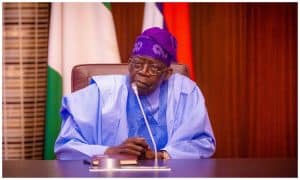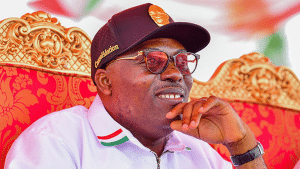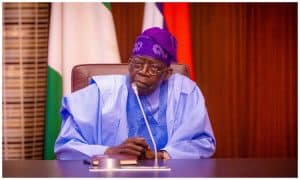Nigeria’s foreign debt is projected to increase to approximately $51 billion, following President Bola Tinubu’s request to the Senate for approval to borrow an additional $7.8 billion and €100 million as part of his 2022-2024 borrowing plan.
Some financial analysts have disputed the official rationale behind the borrowing, suggesting that it is primarily intended as a short-term loan to address the country’s current balance of payments crisis.
As of June 2023, Nigeria’s foreign debt stood at $43.2 billion, with domestic debt reaching N54.1 trillion, resulting in a total public debt of N113.4 trillion. With the president’s request for additional borrowing, coupled with the depreciation of the naira, the total public debt is projected to reach N130 trillion.
In a letter addressed to the Senate on Wednesday, the President explained that the request was based on approval granted by the previous President Muhammadu Buhari-led administration, following a Federal Executive Council meeting in May 2023. Senate President Godswill Akpabio read Tinubu’s request during a plenary session.
Tinubu’s letter states: “The Senate should take note that the previous administration approved the 2022-2024 borrowing plan during the Federal Executive Council meeting on May 15, 2023. The projects encompass various sectors, with a particular focus on infrastructure, agriculture, health, education, water supply, security, employment, and financial management reforms, among others.
“The total funding required for the projects and programs under the borrowing plan is $7,864,508,559 in dollars and €100 million in euros, respectively. It is worth noting that, following the removal of fuel subsidies and their impact on the country’s economy, the African Development Bank (AfDB) and the World Bank Group (WBG) have expressed interest in supporting the country with $1 billion and $2 billion, respectively, to mitigate economic challenges, in addition to the Federal Executive Council’s approved 2022-2024 external borrowing plan.
“As a result, the requested approval amounts to $7,864,508,559 in dollars and 1,000 million euros. I wish to emphasize that the projects and programs in the borrowing plan were selected based on positive technical and economic evaluations, as well as their expected contributions to the socio-economic development of the country. This includes generating employment, fostering skill acquisition, supporting the emergence of more entrepreneurs, reducing poverty, and ensuring food security to enhance the average Nigerian’s livelihood.
“These projects and programs will be implemented in all 36 states of the federation and the federal capital territory. Given the current economic challenges facing the country, it has become necessary to use external borrowing to bridge the financing gap, which will be directed towards critical infrastructure projects such as power, railways, and healthcare, among others.
“Considering the nature of these facilities and the urgency to restore normalcy to the country, I hereby request the Senate’s consideration and approval of the 2022-2024 external borrowing plan to enable the government to fulfill its responsibilities to Nigerians through prompt disbursement and efficient project implementation.”
Experts Worried Over Debt Profile
Meanwhile, some financial experts have expressed worry over the latest borrowing round the FG plans to execute.
Speaking to Vanguard on President Tinubu’s request for approval of an additional loan, David Adonri, analyst and Executive Vice Chairman at Highcap Securities Limited, said: “FGN has over-borrowed, and it is also in a debt trap.
“FGN requires new debt to finance the government and meet debt repayment obligations. The situation is even more complicated now that Nigerian Letters of Credit are no longer honoured. This means the economy requires an immediate bridging loan to address the current balance of payment crisis.
“I don’t think the new borrowing relates to FGN’S 2022-2024 borrowing plan. It is to bridge current FX deficit and keep external credit lines open. This panic measure will only give temporary relief. What is needed urgently is for FGN to negotiate with creditors and reschedule outstanding trade and multilateral debts.”
Economy is seriously challenged on all fronts – Olayinka
In his reaction, Tajudeen Olayinka, analyst and CEO, Wyoming Capital and Partners, said: “If we accept the fact that Nigeria’s economy is seriously challenged on all fronts and in a state of disequilibrium, then every effort by government to restore equilibrium at this time should be seen as a reactionary emergency. I think government is trying to improve dollar liquidity in the foreign exchange market, the same way they are trying to deal with myriad of economic problems left behind by former President Muhammadu Buhari: inadequate foreign reserves, humongous stock of public debt, extremely low oil revenue, unsustainable level of revenue to debt service ratio, poor purchasing power and mounting inflationary pressure, etc. So, in a way, additional borrowings to improve confidence in the economy might just be inevitable at this time.”
Continuing, he said: “My advice to government is to ensure they run a comprehensive adjustment programme that can restore equilibrium to the economy, using the right set of people with good knowledge of adjustment programme. I believe the current economic problem is temporary.”
Govt should rely on non-debt financing sources – Prof Uwaleke
Commenting, Prof Uche Uwaleke, said: “What is the purpose of the loan? What are the terms? What is the source of repayment? These are some relevant questions the lawmakers should ask Mr President.
The government should stick to its promise of relying more on non-debt financing sources given the fact that the country is already in debt crisis.”
It will stabilise exchange rate, reduce further devaluation of Naira – Kurfi
Mallam Garba Kurfi, Managing Director/CEO, APT Securities and Fund, observed that the planned borrowing is good as it will stabilise the exchange rate market and reduce further devaluation of the Naira.
He opined that it is needed in order to meet the huge demand for FX.
His words: “It is better late than never. This borrowing should be done before the unification into single exchange rate. This will stabilise the exchange market and reduce the devaluation of Naira.
“We have no choice but to borrow in foreign exchange to meet up the huge demand of FX.”
He added there’s a need for government to ensure that more crude oil is exported in order to earn more dollars. “There is a need to look for other means to export other minerals and agricultural produce in order to earn more foreign exchange.
“We also need to do those things that will attract more remittances from diaspora. Last year, diaspora remittances contributed more than $20 billion to the economy,” he said.
FG should discontinue plans to borrow- Ubaka
Also commenting, Johnny Ubaka, Secretary of Association of Concerned Freight Forwarders and Transporters, ACFF&T, said: “The Federal Government has been charged to discontinue plans to borrow $7.8 billion and 100 million Euros but instead it should concentrate on improving the nation’s export volume as well as production capacity.”
Speaking with Vanguard, Secretary of the association, Ubaka, said: “Improving the nation’s export volume as well as production capacity, if sustained, would help increase the country’s Gross Domestic Product, GDP.”
On what alternative source of funds the government can consider, Ubaka said that the government income has improved greatly since it started double taxation, especially in the maritime sector.
He said before now, import duty was N4 million, but it has been hiked to N8 million. He further stated that with the volume of import that comes through the nation’s seaports, the revenue accruable would have also doubled.
The post Debt Surge: Tinubu’s $7.8 Billion And €100 Million Plea Pushes Foreign Debt Beyond $51 Billion appeared first on Naija News.






